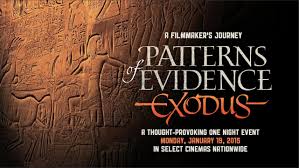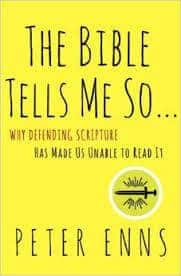 I’ve been asked a few times in recent weeks if I would comment on the recently released documentary Patterns of Evidence: Exodus.
I’ve been asked a few times in recent weeks if I would comment on the recently released documentary Patterns of Evidence: Exodus.
I wasn’t able to see the film, since it has not been widely released, but I perused the film’s website, watched trailers, and read reactions.
It struck me rather quickly that the film would likely rehash and repackage arguments for the historical accuracy of the exodus story in the Bible. Fine. Whatever.
I was more concerned, though, that the film would give the impression that something new was happening here, and that the historical veracity of the Bible has been successfully defended, or at least serious doubt cast on the “so-called scholarly consensus,” thus rendering it dismissible, at least in the court of popular opinion (with or without seeing the movie).
Over the last few weeks, I feel that my suspicions have been confirmed. If the entire film becomes readily (and cheaply) available, I will watch it in its entirety. If anything changes my perceptions, I’ll let you know.
The documentary claims to want to create “dialogue” by handling evidence “fair-mindedly” and letting the audience decide for themselves whether the exodus happened. In the same breath, the documentary claims to “show the evidence that the scholars don’t want the world to see – because it could cause them to shift their long-held positions.”
This kind of conspiracy-theory rhetoric isn’t encouraging.
The documentary is aimed at challenging the scholarly consensus that the exodus from Egypt, along with the conquest of Canaan and the Patriarchal narratives, are not historical.
First, this assertion needs to be nuanced.
The scholarly consensus (and it is a consensus) is not that “nothing happened” and the biblical narrative was woven out of whole cloth.
Many–I would say most–biblical scholars and historians would say that the biblical narrative echoes real, though distant, historical events. (For the record, that’s my opinion, too.)
In other words, “something happened.” The sticking point is how much and what can be shown on archaeological grounds to corroborate the exodus and conquest narratives.
The consensus view is that the biblical narratives do not depict “what happened” if someone were there with the proverbial video camera recording the birth of the people of Israel. Rather–as it is often put–these biblical narratives “mythicize” the long distant past, i.e., they present us with Israel’s reflections on its origins from a much later vantage point.
Among biblical scholars and historians, that much is not controversial. Even some evangelical scholars would be generally at ease with this assessment (e.g., James Hoffmeier and Kenneth Kitchen), though they would want to qualify their view considerably.
But a “strong scholarly consensus” certainly exists. The exodus and conquest narratives do far more than “report history.”
The reason this scholarly consensus exists is that the archaeological evidence for the exodus and conquest is, to put the best face on it, circumstantial. Mostly, however, the evidence for either episode seems to be either non-existent or contrary to the biblical depiction (the latter especially with respect to the conquest of Canaan).
Most all biblical scholars think the Israelites began writing their national epic (which eventually became the Hebrew Bible or Old Testament) some time after the establishment of their monarchy (perhaps in the 10th century BCE, not long after the time of David). This process continued over the centuries and came to an end several hundred years later, after the captives returned from Babylonian exile (in 539 BCE).
Testament) some time after the establishment of their monarchy (perhaps in the 10th century BCE, not long after the time of David). This process continued over the centuries and came to an end several hundred years later, after the captives returned from Babylonian exile (in 539 BCE).
This is why the biblical accounts of Israel’s monarchy and exile regularly mention specific individuals and events that can be corroborated with other ancient writings.
We do not see this corroboration with the stories of Israel’s origins, its “deep past,” like the exodus. (I lay all this out in more detail for a general audience in The Bible Tells Me So.)
Again, this doesn’t mean “nothing happened” but that we simply don’t have anything resembling clear outside corroboration.
My point: I’m not sure what evidence the film will point us to that biblical scholars “don’t want the world to see” to protect their pet theories.
I am all for reassessing evidence, looking at things from a different angle, especially when new evidence comes to light. That’s what scholars do, and so should everyone.
And if there were real reasons for casting serious, scholarly, doubt on the consensus concerning the exodus, I would be thrilled. But there isn’t.
Judging from what I’ve seen and read, the only “new” evidence brought forward in the documentary seems to be a minority theory that began gaining (and then losing) traction in the 1990s, often called the “New Chronology.”
The Wikipedia article on the New Chronology is very good if you want some background. The gist is that a respected Egyptologist David Rohl has called into question the scholarly consensus on Egypt’s chronology.
Who cares?
Once you do that, you have to reassess all the chronologies of all the other nations around Egypt so they match up–including Israel’s. According to Rohl, refiguring Egypt’s chronology would require Israel’s chronology to be backed up about 300 years.
Who cares?
This makes it possible to line up somewhat better the stories of Joseph, exodus, and conquest with some corroborating archaeological evidence. (For example, the period of Joseph would line up somewhat with the “Hyksos” period and the fall of Jericho could be placed in the 15th century when there was actually a populated city there.)
David Rohl is a well respected Egyptologist, and his views were not dismissed out of hand. They have been substantively and fairly engaged, in part because Egyptologists by and large don’t really care about how things line up with biblical chronologies.
Nevertheless it is fair to say that the New Chronology has not gained wider academic support, in large part because it creates more problems than it solves, and is therefore not a good basis for essentially realigning ancient Near Eastern chronology as a whole–even if on the popular level some might want to run with with it. (See Wikipedia article.)
I am making a point of this because the film’s director/producer Tim Mahoney seems to have run with it.
But let’s let Egyptologists and others go back and forth about all that. What interests me is how this film seems poised to support–and in fact already is supporting–a culture war mentality around the Bible and the non-negotiable theological need for it to be historically accurate, or else. For my tastes we’ve had quite enough of that to last us another Christendom or two.
I am concerned that a fringe academic idea is going to be used by conservatives, eager to seek any way to “defend the Bible,” as “evidence” that the scholarly consensus is just plain wrong (“See, we told you!”), and that those who robotically continue to hold to the consensus, those liberal academics, are the real fundamentalists–blinded by their own ideology and unwilling to join evangelicals in maintaining a true open mind.
It’s this culture-war mentality I want to look at.
Tomorrow, we look at the film’s own website to see the stated rationale for making this documentary. The culture-war rhetoric is unguarded, which in my view further renders suspect any claim to encouraging dialogue, popular or academic.
